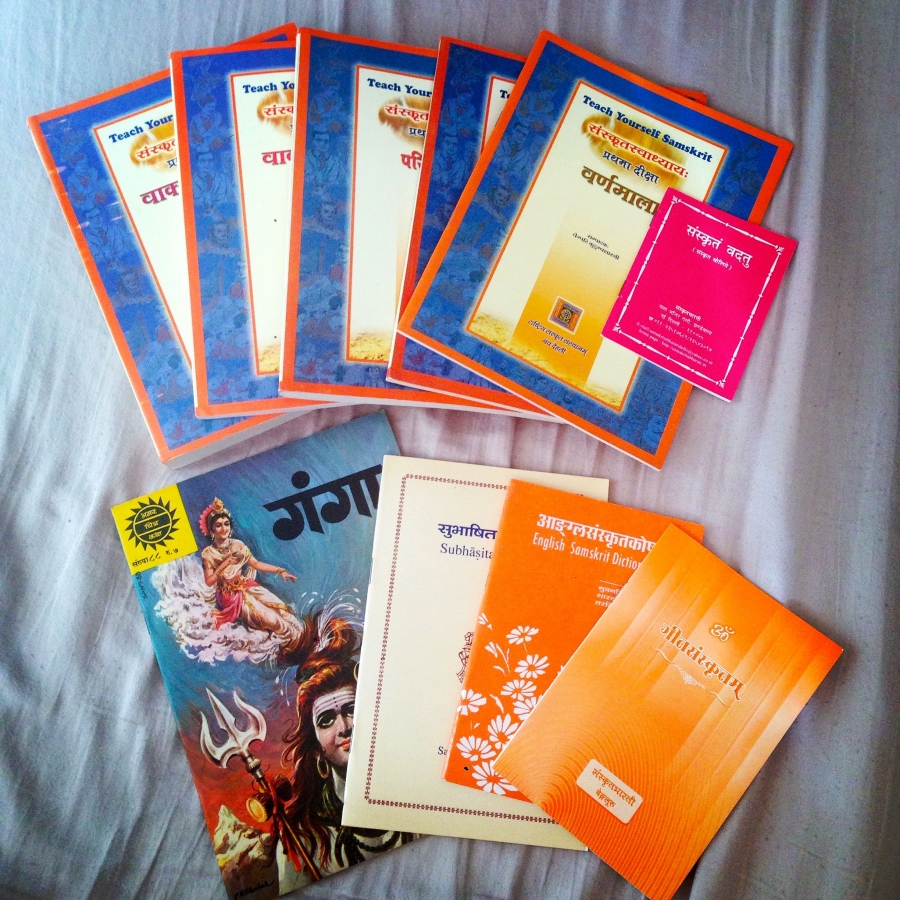 |
| The West loves the Indo-European Sanskrit language. The cast of the Sanskrit play "The Cleverness of the Thief." Patricia Sauthoff is in center wearing white (Patricia Sauthoff). |
 |
| IVC/India's Sanskrit affected Tibetan as well as many Vajrayana Buddhist practices. |
 |
| Learning Sanskrit materials (Sauthof |
Sanskrit has been lingering at the edges of Western culture for a while now. It’s an obscure language that not many people know, but a lot of people know about.
I started studying Sanskrit as a written language a few years ago. Back then, when I told people about it, they assumed I was a big "White Album"-era Beatles fan or into Transcendental Meditation. Now they just assume I spend a lot of time doing yoga.
 |
| Sanskrit's sacred sound goes well with yoga |
I'm actually a Ph.D. candidate at The School of Oriental and African Studies in London. I study Sanskrit so I can do research and read ancient texts, not order lunch or hail a cab. But last year my studies took a turn for the practical when I decided to take a conversational Sanskrit course over the summer.
 |
| Sanskrit tattoos (chakraboosters.com) |
Sanskrit is an ancient language, but it’s actually pretty easy to hear it out in the world -- if you know where to look. India's 2001 census counted 14,000 Indians [most probably Hindu nationalists who do not realize the language did not originate in India but in neighboring lands of the ancient Indus Valley Civilization] who claimed it as their mother tongue.
There are Sanskrit language newscasts; I’ve seen Shakespeare and other plays performed in Sanskrit here in London; and there is a community of language learners and teachers from around the world who gather on Twitter to share their knowledge, ask for help, and meet others interested in communicating in Sanskrit.
Sanskrit serious in England, stand up in India?
(NDTV) Sanskrit is thriving among former British imperial colonialists: At St. James Junior School in London, the number of students wanting to learn it has grown by leaps and bounds.
(Jay Hind!) Gujarat Sanskrit Academy has started translating Hindi film dialogues into Sanskrit. Sumeet presents some favorites. It's hilarious with a double H (or lame with a double L). He's mostly speaking Hindi with English mixed in.
Some are in India, some are part of the Indian diaspora, and some -- like me -- are Westerners interested in learning something more about the language and culture of South Asia.
And it does look like interest in Sanskrit is growing. The study of Sanskrit is certainly surging in popularity, both in India and in the West. Students at Princeton Univerisity recently launched a petition to get Sanskrit back into the curriculum. And at my own school, the second-year Sanskrit course grew to 20 this year, up from just two the year before.
 |
| Sanskrit came from space like this crop circle. |
It turns out spending a month speaking Sanskrit day-in and day-out is pretty surreal. Instead of reading philsophy books, I learned how to say things like telephone -- दूरभाष dūrabhāṣā -- and bicycle -- द्विचक्रिका dvicakrikā. It reminds me that Sanskrit isn’t just a [dead] language of dusty books. And as anyone who has ever namaste-d knows, it’s a language that’s really fun to say out loud -- or even to sing.
 |
| India has 100 million+ Muslims, marry one. |
There were 20 of us in the class, learning, speaking and singing six days a week for four weeks.
Several of my classmates were Indians living in Europe. Some were graduate students like myself, and others were professionals taking a break from work. There was even a Buddhist monk who out-chanted us all. More
- Madonna trips, falls on stage during concert
- A week trapped watching Russian TV (NY Times)
- Why do racist police keep killing with impunity?
- Top drug lord captured in Mexico
- Democrats play hardball: GOP "suicide"
- Russian politician Nemtsov shot dead
- Snow keeps falling in the South
- Mesopotamian art of Iraq (ISIS)

































































































































































































































No comments:
Post a Comment